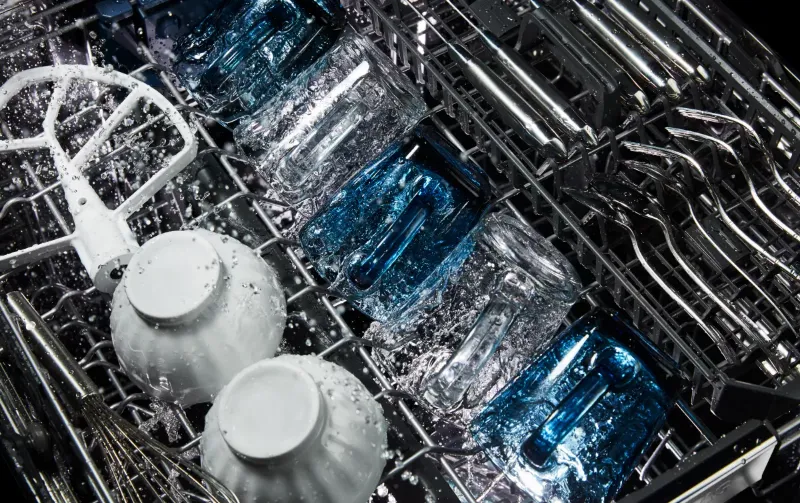Can Dishwashers Run on Cold Water? Myths Busted!
We may earn affiliate fees for purchases using our links (at no additional cost to you).
Dishwashers are designed to use hot water; running them on cold water may not yield optimal cleaning results. Most models do not have built-in heaters to warm up cold water to effective cleaning temperatures.
Understanding the nuances of dishwasher operation is essential for maintaining the efficiency and longevity of the appliance.
Dishwashers typically connect to the home’s hot water supply, heating water to temperatures around 130–140 degrees Fahrenheit, which is the sweet spot for removing grease and grime from dishes.
These temperatures also activate dishwasher detergents, which are specifically formulated to work best under hot water conditions.
Employing cold water can prevent effective sanitization and may leave residues or food particles, leading to additional cycles and increased energy use.
While some modern dishwashers do have internal heaters, they’re meant to boost incoming water temperature rather than heat from cold.
Ensuring your dishwasher uses the correct water temperature is crucial for clean dishes and energy-efficient operation.

The Science Of Dishwasher Water Temperature
Dishwashers are designed to perform optimally at a specific range of water temperatures, typically between 120°F to 150°F (49°C to 65°C).
This ideal water temperature ensures efficient cleaning by effectively breaking down food residues and grease.
The high temperature also aids in the sanitization process, eliminating a majority of common bacteria and germs found in dishes.
Detergent performance is significantly influenced by water temperature.
Most dishwasher detergents are formulated to activate and dissolve properly in warm water.
Using cold water, which is generally below 110°F (43°C), can lead to suboptimal cleaning results as detergents may not dissolve thoroughly, potentially leaving residue on dishes and reducing overall cleaning power.
| Water Temperature | Efficiency in Cleaning | Detergent Performance | Germs and Bacteria Removal |
|---|---|---|---|
| 120°F to 150°F | Optimal | Activates Effectively | High Sanitization |
| Below 110°F | Reduced | Poor Dissolution | Low Sanitization |
Fact Vs Fiction: Cold Water Dishwashing Myths
Dishwashers are commonly believed to require hot water to effectively sterilize dishes.
It is a misconception that higher temperatures are pivotal for killing bacteria and germs on eating utensils.
The truth is that most modern detergents are designed to work efficiently at lower temperatures, and the sanitization process is achieved through the use of chemicals present in the detergents rather than the water temperature itself.
Utilizing cold water in dishwashers can lead to significant energy savings, reducing the cost of utility bills.
It also lessens the environmental footprint by saving on the energy required to heat water.
Tips For Optimal Dishwasher Performance With Cold Water
Choosing the right detergents is crucial for cold water cycles in dishwashers.
Detergents formulated for lower temperatures help break down food residues effectively, ensuring a thorough clean.
Seek out products specifically labeled for use in cold water to optimize your dishwasher’s performance.
Pre-rinsing dishes can greatly improve cleaning results with cold water.
By removing larger food particles, you enhance the efficiency of the cold water cycle.
This step can be especially beneficial when using eco-friendly dishwashers that are designed to conserve energy.
Utilizing the appropriate energy-efficient settings on your dishwasher can lead to substantial savings.
Cold water settings are generally designed to minimize energy consumption, making the most of your dishwasher’s performance while reducing utility costs.
Frequently Asked Questions For Can Dishwasher Run On Cold Water
Can Dishwashers Use Only Cold Water?
Do Cold Water Dishwashers Exist?
Is Hot Water Necessary For Dishwashers?
Will Cold Water Clean Dishes Well?
Conclusion
Wrapping up, dishwashers are quite adaptable to water temperature.
While they typically use hot water, running them on cold isn’t off-limits.
It’s essential to consider the detergent type and cleaning needs unique to your dishes.
For those seeking energy efficiency, cold water cycles offer an alternative, albeit with potential trade-offs in performance.
Balancing eco-friendliness with effective cleaning, the cold water option remains an interesting choice for eco-conscious homeowners.